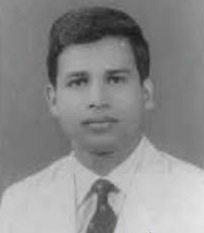A. Thurairajah facts for kids
Quick facts for kids
Professor
A. Thurairajah
|
|
|---|---|
|
அ. துரைராசா
|
|
 |
|
| 2nd Vice-Chancellor of the University of Jaffna | |
| In office September 1988 – April 1994 |
|
| Preceded by | S. Vithiananthan |
| Succeeded by | K. Kunaratnam |
| Personal details | |
| Born | 10 November 1934 Kamparmalai, Ceylon |
| Died | 11 June 1994 (aged 59) Colombo, Sri Lanka |
| Alma mater | Udupiddy AMC Hartley College University of Ceylon University of Cambridge |
| Profession | Academic |
| Ethnicity | Sri Lankan Tamil |
Alagiah Thurairajah (Tamil: அழகையா துரைராசா; 10 November 1934 – 11 June 1994) was a famous Sri Lankan academic. He was also the vice-chancellor of the University of Jaffna. This means he was the main leader of the university.
Early Life and Education
Alagiah Thurairajah was born on 10 November 1934. His birthplace was Kamparmalai in northern Ceylon, which is now Sri Lanka. His parents were Velupillai Alagiah and Sellammah.
He went to school at the Udupiddy American Mission College and Hartley College. After finishing school, he started studying at the University of Ceylon in July 1953. He earned a Bachelor of Science (BSc) degree in civil engineering in 1957. Civil engineering is about designing and building things like roads, bridges, and buildings.
After his first degree, Thurairajah worked as an instructor at the university. He taught civil engineering. In March 1958, he worked for the Public Works Department for a short time.
Then, he received a special scholarship to study at the University of Cambridge in England. He became a research student for Professor Kenneth H. Roscoe. From October 1958 to December 1961, Thurairajah helped Professor Roscoe with his research. They studied how different soils behave when pushed or pulled. This important research helped him earn a PhD degree in June 1962. A PhD is a very high university degree that shows you are an expert in your field. His research was about the properties of clay (kaolin) and sand.
Thurairajah married Rajeswari. They had five children together: three daughters and two sons.
A Brilliant Career
After finishing his studies in Cambridge, Thurairajah worked in London for a company called Terreasearch Ltd in 1962. Soon after, he returned to Ceylon. He joined the University of Ceylon as a lecturer.
He also spent time as a visiting assistant professor at the University of Waterloo in Canada. In 1971, he became a Professor of Civil Engineering at the University of Ceylon. This was a big achievement!
He served as the Dean of the Faculty of Engineering at the University of Sri Lanka's Peradeniya Campus. He held this important role from May 1975 to September 1977, and again from February 1982 to February 1985. A dean is a leader of a specific department or faculty within a university.
He was also a visiting professor at the University of British Columbia in Canada. This was from October 1977 to December 1978. Later, he was the Dean of the Faculty of Engineering at the Open University of Sri Lanka. He held this position from April 1987 to August 1988.
University Leadership
In September 1988, Professor Thurairajah became the Vice-Chancellor of the University of Jaffna. The vice-chancellor is like the president or chief executive of a university. It's a very important leadership role. He led the university until March 1994, when he had to resign due to health reasons.
Professor Thurairajah moved to Colombo for medical treatment. He rejoined the Open University. Sadly, he passed away on 11 June 1994, due to heart problems caused by a serious illness.
Honoured for His Work
After his death, Professor Thurairajah was given a very special honour called Maamanithar. This means 'Great Man' and is a high award given to people who have made big contributions.
Professor Thurairajah was recognized by many important groups. He became a fellow of the National Academy of Sciences (Sri Lanka) in 1977. He was also a fellow of the Institution of Civil Engineers (Sri Lanka) from 1979. In May 1985, he became a fellow of the Institution of Civil Engineers (UK). Being a fellow means you are a highly respected member of a professional group.
He was the president of the National Academy of Sciences (Sri Lanka) in 1986. He also led the Institution of Civil Engineers (Sri Lanka) as president from October 1989 to October 1990. He was known as a top expert in soil engineering.

